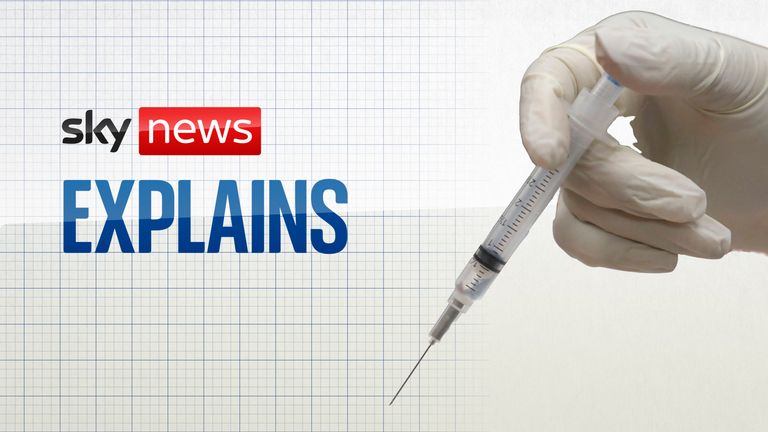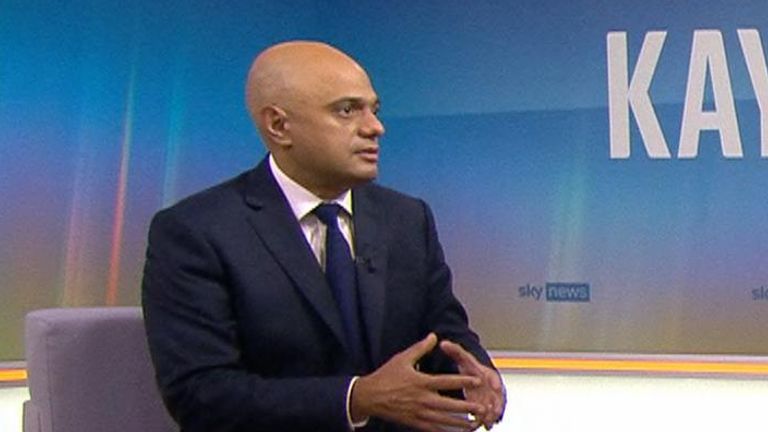The prime minister is set to announce how the rollout of third coronavirus vaccines will work in the UK as part of his COVID winter plan.
Two out of the three jabs currently in use have been approved as booster jabs.
But co-developer of the Oxford-AstraZeneca vaccine Dame Sarah Gilbert has said she “doesn’t think we need to boost everybody”.
Also, the director-general of the World Health Organisation (WHO), Dr Tedros Adhanom Ghebreyesus, has asked wealthier countries to halt booster jab programmes until at least the end of the year to allow poorer nations to catch up with first and second doses.
Here Sky News looks at the case for booster vaccines.
Why does the government want people to have third doses?
Data has shown that the coronavirus vaccines currently in use in the UK offer at least six months of protection.
Beyond that, scientists believe immunity can start to wane and vaccines can become less effective.
In the UK, the government’s Joint Committee on Vaccination and Immunisation (JCVI) has recommended third doses for certain, vulnerable groups so they are not hospitalised with the virus and extra pressure is not put on the NHS.
Booster jabs would “ensure the protection that has been built up in the population does not decline in the winter months” as “NHS pressures are most acute” during that period, according to the JCVI.
Modelling also suggests that this year’s flu season could be earlier and up to 50% larger than usual, which would put even more strain on the health service.
This is why the JCVI is recommending third COVID and flu jabs for all vulnerable groups.
What does the science say?
Israel is the only country with any data on the efficacy of third vaccine doses, as it was the first to start administering them.
People over the age of 60 began getting Pfizer booster jabs there at the end of July – provided they had their second dose at least five months before.
On 22 August, the Israeli health ministry published data that showed a third dose of Pfizer “significantly improved protection from infection and serious illness” for people in that age group.
It said protection against infection 10 days after a third dose was four times higher than after two doses.
And protection against serious illness or hospitalisation was between five and six times higher 10 days after the third jab, the study said.
As of 9 September, the Pfizer and AstraZeneca jabs were approved for use as boosters in the UK.
The Medicines and Healthcare products Regulatory Agency (MHRA) says that anyone can get a Pfizer booster – regardless of which shot they had previously – but only AstraZeneca boosters will be offered to people who had that jab before.
There is no data yet on the efficacy of combining two doses of one vaccine with a third dose of another.
The JCVI is waiting for the results of the Cov-Boost trial, which is being run by the University of Southampton and will test mixing Pfizer with AstraZeneca, Moderna, Novavax, Janssen, Valneva and Curevac doses.
What is the case against third doses?
The main concern about booster jabs among scientists and public health experts is vaccine inequity.
Since the start of the pandemic, experts have warned it will not end until the majority of the world population is vaccinated.
WHO data shows that 5.5 billion doses have been given out so far – but 80% have been in middle-to-upper income countries.
According to the WHO: “Offering booster doses to a large proportion of a population when many have not yet received even a first dose undermines the principle of national and global equity.
“Prioritising booster doses over speed and breadth in the initial dose coverage may also damage the prospects for global mitigation of the pandemic, with severe implications for the health, social and economic well-being of people globally.”
Follow the Daily podcast on Apple Podcasts, Google Podcasts, Spotify, Spreaker
Wealthier countries are encouraged to donate COVID vaccines to poorer ones through WHO and UNICEF’s COVAX programme.
But despite one billion doses being offered to other countries so far, WHO director-general Dr Tedros says fewer than 15% of them have “materialised”.
On 8 September, Dr Tedros called for a halt to any booster jab programmes until the end of the year to allow all countries to vaccinate at least 40% of their populations.
He added that he is “appalled” at claims by vaccine manufacturers that global supply can cover third jabs – while others have had none.
“I will not stay silent when companies and countries that control the global supply of vaccines think the world’s poor should be satisfied with leftovers,” he said.
What about the most vulnerable?
Although it’s undecided on the overall efficacy of booster vaccines, WHO says that any third jab rollout should be “firmly evidence-driven and targeted to the population groups in greatest need”.
It says that boosters could be considered if studies show protection from two doses is waning and if new COVID variants are able to bypass vaccines.
This is particularly important for people who are at greater risk of getting seriously ill or dying from the virus.
Dame Sarah Gilbert, who co-developed the Oxford-AstraZeneca vaccine, said this month that she “doesn’t think we need to boost everybody” as “immunity is lasting well for the majority of people”.
But she did say the “immunocompromised and elderly will receive boosters”.
Dr Hans Kluge, WHO regional director for Europe, has also argued for boosters for the vulnerable.
Asked about vaccine inequity, he said: “A third dose of vaccine is not a luxury booster taking away from someone who is still waiting for a first jab.
“It’s basically a way to keep the people safe, the most vulnerable.”
Who is considered most vulnerable and who will get their boosters first?
People who were in the JCVI’s original one to nine priority groups to get their first and second doses are recommended to get their third doses first.
The booster rollout will be divided into two, before the rest of the population under 50 are given one.
Stage 1
Potentially from this month:
• Adults aged 16 and over who are immunosuppressed
• People living in residential care homes for older adults
• All adults aged 70 and over
• Adults aged 16 and over who are clinically extremely vulnerable
• Frontline health and social care workers
Stage 2
“As soon as is practicable after Stage 1”:
• All adults aged 50 and over
• All adults 16 – 49 years who are in an influenza or COVID at-risk group as outlined in the Green Book
• Adult household contacts of immunosuppressed people
The government will announce when the booster programme begins on Tuesday.







